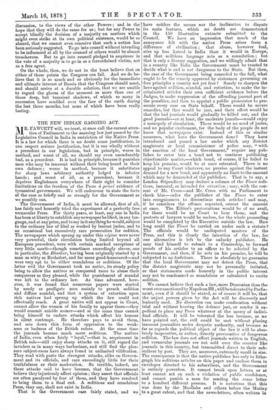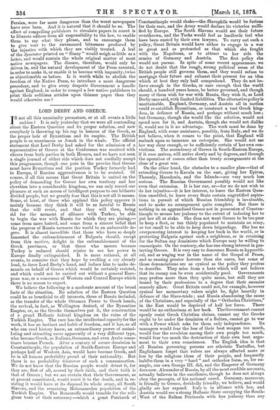TEE NEW INDIAN GAGGING ACT.
MR. FAWCETT will, we trust, at once call the earnest atten- tion of Parliament to the amazing law just passed by the Legislative Council in India in restriction of the Native Press. It is a law for which there is no doubt some justification, in one respect serious justification, but it is one wholly without a precedent in our legislation, bad in principle, worse in method, and worst of all, we should say even unendurably bad, as a precedent. It is bad in principle, because it punishes men who may be innocent without their being heard in their own defence ; worse in method, because it substitutes for sharp laws arbitrary authority lodged in inferior hands ; and worst of all, as a precedent, because it deprives Englishmen everywhere of their right to consider limitations on the freedom of the Press a priori evidence of tyrannical government. We will endeavour to state the facts of the case as briefly and as strongly for the Government as we possibly can.
The Government of India, it must be allowed, first of all, has fairly and honestly tried the experiment of a perfectly free vernacular Press. For thirty years, at least, any one in India has been at liberty to establish any newspaper he liked, in any lan- guage, and at any price, and to say in it anything he would, subject to the ordinary law of libel as worked by lenient juries, and to an occasional but excessively rare prosecution for sedition. The newspapers which sprang up under this re'gime were never very powerful, their circulation being limited beyond all European precedent, were with certain marked exceptions of very little merit—though sometimes exceedingly clever, one in particular, the Bhaskur, having been originally started by a man as witty as Rochefort, and far more good-humoured—and were very apt to be either scandalous or seditious. Of the latter evil the Government took no notice, its steady policy being to allow the natives as conquered races to abuse their conquerors as they pleased, while the punishment of scandal was left to the ordinary law. As time advanced, how- ever, it was found that numerous papers were started by needy or profligate men mainly to preach sedition and diffuse scandal, and that a system of extortion upon rich natives had sprung up which the law could not effectually reach. A great native will not appear in Court, cannot allow the women of his family to appear there—they would commit suicide sooner—and at the same time cannot bring himself to endure attacks which affect his honour in silent contempt. He therefore pays to avoid them, and sets down this form of oppression to the weak- ness or badness of the British rulers. At the same time the journals became much more seditious. The natives of India, even when fairly "loyal,"—that is, acquiescent in British rule—still enjoy sharp attacks on it, still regard the invaders as in many ways barbarians, and still find the plea- sure subject-races have always found in unlimited vilification. They read with gusto the strongest attacks, alike on Govern- ment and its officials, and care exceedingly little for their truthfulness or their moderation. So terrible, indeed, are these attacks said to have become, that the Government believe they injuriously affect opinion ; they assert that officials are often paralysed by fear of them, and they have resolved to bring them to a final end. A seditious and scandalous Press, they say, shall not exist in India.
That is the Government case fairly stated, and we have neither the means nor the inclination to dispute its main features, which no doubt are demonstrated in the 150 illustrative extracts submitted to the Council. We have an impression that much of the annoyance felt with the native Press arises from a difference of civilisation ; that abuse, however foul, stirs up less hatred in India than it would in Europe, and that seditious language acts as a consolation ; but that is only a literary suggestion, and we willingly admit that in a country like India the Government must be trusted to decide what is and is not dangerous to the State. But then, the case of the Government being conceded to the full, what ought to be the remedy approved by statesmen governing on free principles a country not yet free ? Surely to sharpen the laws against sedition, scandal, and extortion, to make the in- criminated articles their own sufficient evidence before the Judges, to make suppression of the offending journal part of the penalties, and then to appoint a public prosecutor to pro- secute every case on State behalf. Those would be severe remedies, but they would be just, and their effect would be that the bad journals would gradually be killed out, and the good journals—or at least, the moderate jourals—would enjoy a monopoly of circulation. There would be no need of juries, and no popular excitement, for the body of the people do not know that newspapers exist. Instead of this or similar measures, what have the Government done ? They have introduced and passed a law under which any district magistrate or local commissioner of police may, "with the sanction of the local Government," require any pub- lisher to enter into a bond not to continue publishing objectionable matter,—which bond, of course, if he failed to keep his promise, would be at once estreated. There is no appeal to any Court whatever, no proviso against the instant demand for a new bond, and apparently no limit to the amount which may be demanded of the publisher. That is to say, a London Stipendiary may declare a column of the Times sedi- tious, immoral, or intended for extortion ; may, with the con- sent of Mr. Cross—and Mr. Cross with no Parliament to check him—order the publisher of the Times to enter into recognisances to discontinue such articles I and may, if he considers the offence repeated, estreat the amount at once. The Editor's protestations would be of no avail, for there would be no Court to hear them, and the protests of lawyers would be useless, for the whole proceeding would be completed by the Executive outside the law. How long could the Times be carried on under such a statute? The officials would be undisputed masters of the Press, and this is clearly the intention of the law, for one alternative is left to the unlucky publisher. He may bind himself to submit to a Censorship, to forward proofs of his articles to an officer to be selected by the Government, and then, if he acts on his promise, he will be subjected to no forfeiture. There is absolutely no guarantee that the local Government may not detest the Press, that the district magistrate may not be personally irritated, or that statements made honestly in the public interest may not be condemned as scandalous or calculated to excite sedition.
We cannot believe that such a law, more Draconian than the worst ever sanctioned by Napoleon III., will be tolerated by Parlia- ment, even if it should be stated, as of course it will be, that the unjust powers given by the Act will be discreetly and leniently used. No discretion can make confiscation without trial and without hearing the defence just, or render it ex- pedient to place any Press whatever at the mercy of indivi- dual officials. It will be tolerated the less because, as we have pointed out, the evil could be met without placing innocent journalists under despotic authority, and because as far as regards the political object of the law it will be abso- lutely inoperative, or rather, directly provocative of dangerous sedition. The law does not affect journals written in English, and vernacular journals are not sold over the counter like journals in this country, but transmitted direct to their sub- scribers by post. They are, moreover, extremely small in size. The consequence is that the native publisher has only to litho- graph his seditious articles on thin paper and enclose them in envelopes directed to his subscribers, and the Government is entirely powerless. It cannot break open letters, or at least cannot act on such a: violation of public confidence, and cannot punish a man for sending the same letter to a hundred different persons. It is notorious that this was done by the Moollahs and others before the Mutiny to a great extent, and that the news-letters, often written in Persian, were far more dangerous than the worst newspapers have ever been. And it is natural that it should be so. The effect of compelling publishers to circulate papers in secret is to liberate editors from all responsibility to the law, to enable them to say what they please, and to encourage them to give vent to the envenomed bitterness produced by the injustice with which they are visibly treated. A leaf of the Spectator printed on " flimsy " would weigh as little as a letter, and would contain the whole original matter of moat Jultive newspapers. The disease, therefore, would only be driven in, and the natural development of the Press arrested, in order to make it, or enable it to become with impunity, twice as objectionable as before. Is it worth while to abolish the freedom of the Native Press, to introduce a most dangerous precedent, and to give every despotic Government a handle against England, in order to compel a few native publishers to print their seditious articles upon thinner paper than they would otherwise use ?



































 Previous page
Previous page